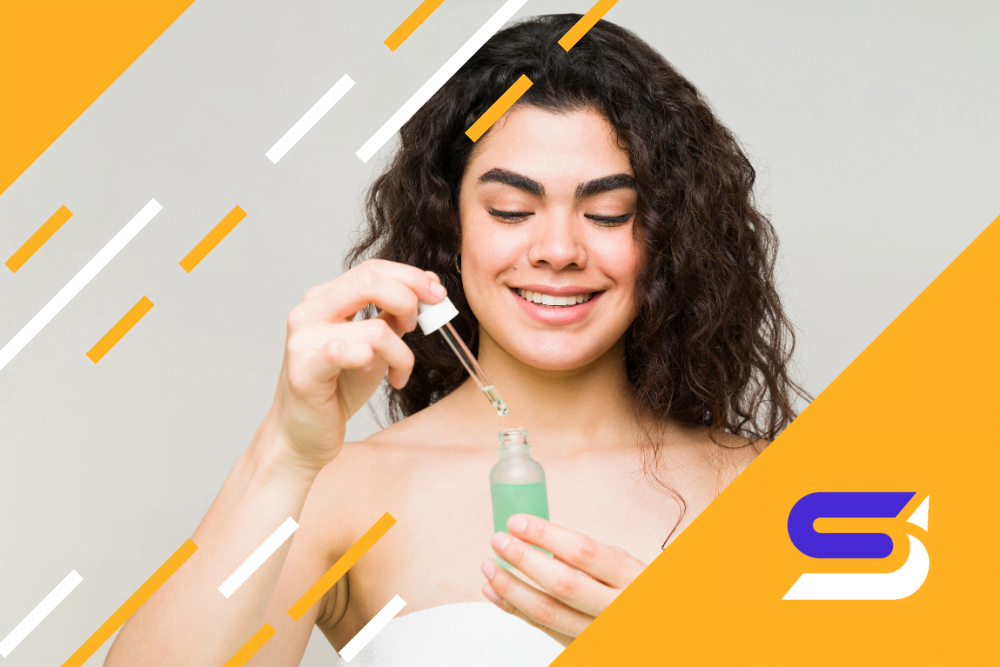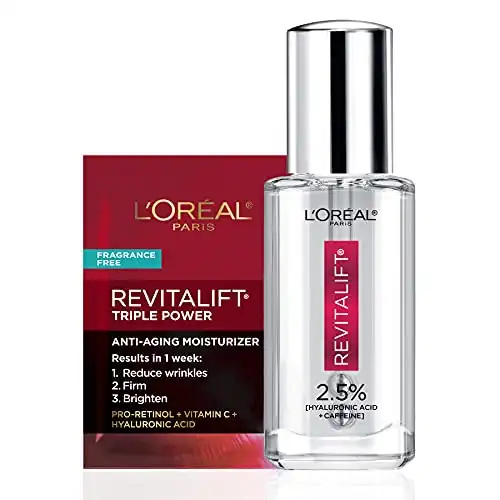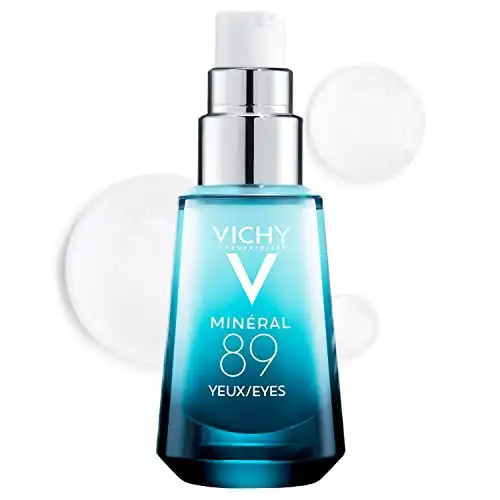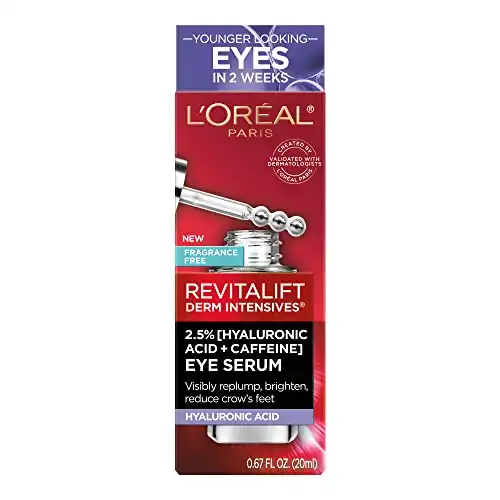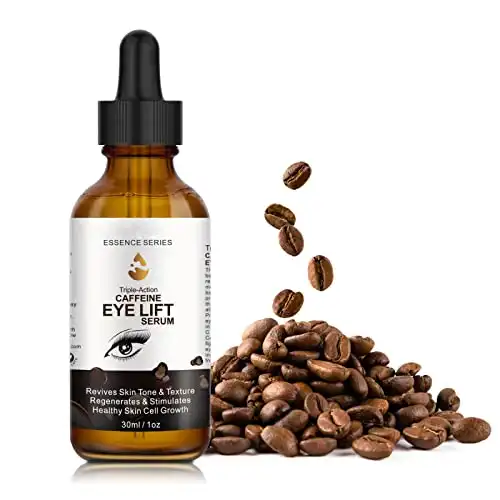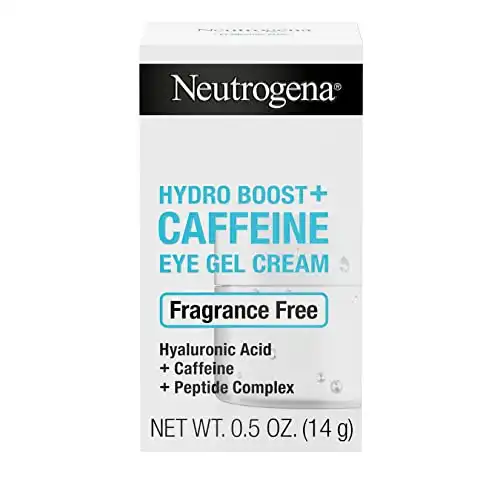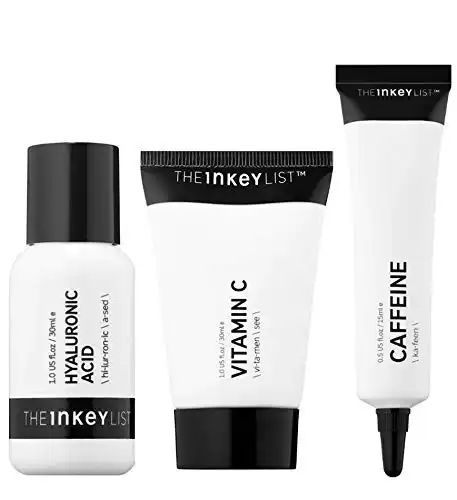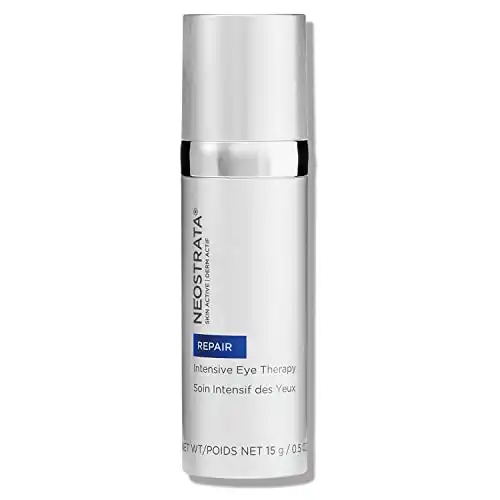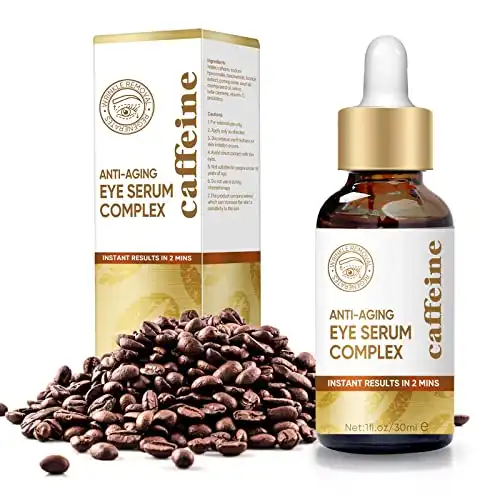Caffeine's Role in Skincare and Puffy Eyes
As a powerful central nervous system stimulant, caffeine has been widely recognized for its energizing effects on the body. However, not many people are aware of the benefits it offers when incorporated into skincare products. Caffeine is an effective vasoconstrictor that helps reduce puffiness and dark circles under the eyes by tightening blood vessels.
Vasoconstrictive Properties of Caffeine
The vasoconstrictive properties of caffeine make it an excellent active ingredient in anti-inflammatory skincare products targeting puffy eyes. By constricting blood vessels beneath the skin surface, caffeine effectively reduces swelling and inflammation caused by various factors such as lack of sleep or allergies. This property also helps minimize dark circles under the eyes resulting from oxidative stress or poor circulation.
Popular Caffeinated Skincare Products
This powerful eye serum is specially formulated to target dark circles and crow’s feet wrinkles, leaving your eyes looking refreshed and well-rested in just two weeks.
The revitalizing formula of this eye serum is enriched with pure Hyaluronic Acid and Caffeine to hydrate and revitalize tired eyes. The unique Triple Roller applicator features three cooling, stainless steel balls for a full eye contour massage, ensuring that the serum is distributed evenly and effectively.
Dermatologist validated, this eye serum is fragrance-free, paraben-free, and allergy-tested, making it suitable for all skin types. Additionally, it is ophthalmologist-tested for safety and suitable for contact lens wearers. Validated in partnership with an advisory panel of dermatologists, you can trust that this product is both effective and safe.
Revitalift Anti-Aging Products are the perfect addition to your skincare routine, providing anti-aging benefits to any part of your body. From creams and eye care treatments to moisturizers, pads, cleansers, toners, and serums, the Revitalift line helps fight the key signs of aging, giving you the confidence to look and feel your best.
As a leading total beauty care company based in Paris, L’Oreal Paris offers innovative products and unique expertise from beauty experts in makeup, skin care, hair care, styling, and hair color. With L’Oreal Paris Revitalift Hyaluronic Acid + Caffeine Hydrating Eye Serum, you can rest assured that you are using a high-quality product from a trusted brand. Get younger-looking eyes and revitalize your skin today with L’Oreal Paris Revitalift Hyaluronic Acid + Caffeine Hydrating Eye Serum.
This lightweight eye cream gel is specially formulated with caffeine, hyaluronic acid, and Vichy Volcanic Water to brighten the eye area, smoothen fine lines, and provide 24-hour hydration for a refreshed and revitalized look.
This eye serum is dermatologist-tested and paraben-free, making it suitable for even the most sensitive skin. The hydrating eye serum is designed to brighten dark circles and under-eye bags while also being ophthalmologist tested, ensuring your eyes’ safety.
Simply apply the serum morning and evening, placing a small drop on your fingertip and applying it to clean the skin around the eye area. The result is a brighter, more youthful appearance that leaves you feeling confident and refreshed.
Vichy Mineral 89 Eyes Serum with Caffeine and Hyaluronic Acid is the perfect addition to your skincare routine, providing a gentle yet effective solution for tired and dull-looking eyes. Trust in the power of Vichy’s natural ingredients and innovative technology to give you the best results possible. Try Vichy Mineral 89 Eyes Serum with Caffeine and Hyaluronic Acid today and experience the benefits of brighter, more refreshed-looking eyes.
This moisturizing eye serum noticeably reduces the appearance of dark circles and crow’s feet wrinkles, leaving eyes looking refreshed and well-rested.
The revitalizing formula is formulated with pure hyaluronic acid and caffeine to hydrate and revitalize tired eyes. It features a unique triple roller applicator with three cooling, stainless steel balls for a full eye contour massage, providing a relaxing and refreshing experience.
Dermatologists validated this eye serum is fragrance-free, paraben-free, and allergy tested, making it safe for even the most sensitive skin. It’s also ophthalmologist tested for safety and suitable for contact lens wearers. Validated in partnership with an advisory panel of dermatologists, you can trust in the effectiveness and safety of this product.
As a bonus, this eye serum includes a sample of L’Oreal’s anti-aging moisturizer, allowing you to add an anti-aging benefit to any part of your skincare routine. The Revitalift line of creams, eye care treatments, moisturizers, pads, cleansers, toners, and serums are designed to help fight the key signs of aging, providing a complete anti-aging solution.
Today, experience the power of L’Oreal Paris Revitalift Derm Intensives Hyaluronic Acid + Caffeine Hydrating Eye Serum and discover the benefits of brighter, more youthful-looking eyes.
This vegan serum is enriched with caffeine and EGCG, which are known to delay pigmentation and reduce the appearance of cellulite while minimizing wrinkles and fine lines.
This Caffeine Eye Serum is specially formulated to be quickly absorbed by the periocular region, creating a protective moisture barrier while stimulating collagen and elastin production in your skin. The result is younger-looking, refreshed eyes that stay moisturized all day long.
With naturally occurring vitamins such as vitamins A, B, C, and E, Beta-Carotene, and powerful fatty acids, this serum fights anti-aging, dark circles, and under-eye bags. The unique blend of natural ingredients is designed to work in harmony to help you achieve a more vibrant, youthful appearance.
Neutrogena Hydro Boost+ Caffeine Eye Gel Cream is the perfect addition to your daily skincare routine. Formulated with a powerful blend of hyaluronic acid, caffeine, and peptide complex, this 0.5-ounce jar reduces the appearance of dark circles, fine lines, and puffiness around the eyes.
The Peptide Complex in this hydrating eye gel cream improves the look of dark circles, while the essential hydrator, Hyaluronic Acid, reduces the appearance of puffiness. Caffeine, a naturally occurring antioxidant, helps to complement the skin’s defenses, giving you a refreshed and revitalized look.
This fragrance-free formula is also free of parabens, phthalates, and dyes, and has not been tested on animals. It is recommended by dermatologists to target dark circles, fine lines, and puffiness in the eye area.
To use, apply a small amount in the morning and at night around the cleansed eye area and gently massage into the skin. Keep the carton for important information and cautions.
When selecting a caffeine-based skincare product, it is important to consider its concentration of caffeine and the other active ingredients that can boost its ability to reduce inflammation and improve overall skin health. Combining caffeine with powerful components like hyaluronic acid or antioxidant-rich extracts can achieve optimal results in combating puffy eyes and maintaining youthful-looking skin.
Caffeine is gaining traction in skincare for its ability to constrict blood vessels. Still, when investigating strategies for encouraging healing and improving skin health, one should consider the possible downsides of combining caffeine with hyaluronic acid.
Hyaluronic Acid's Impact on Wound Healing
Collagen biosynthesis plays an essential role in wound healing, with hyaluronic acid (HA) accelerating this process in injuries to the retina, diabetic foot, bone, and mucus membrane injuries. However, research suggests that caffeine may adversely affect wound healing due to its influence on collagen biosynthesis.
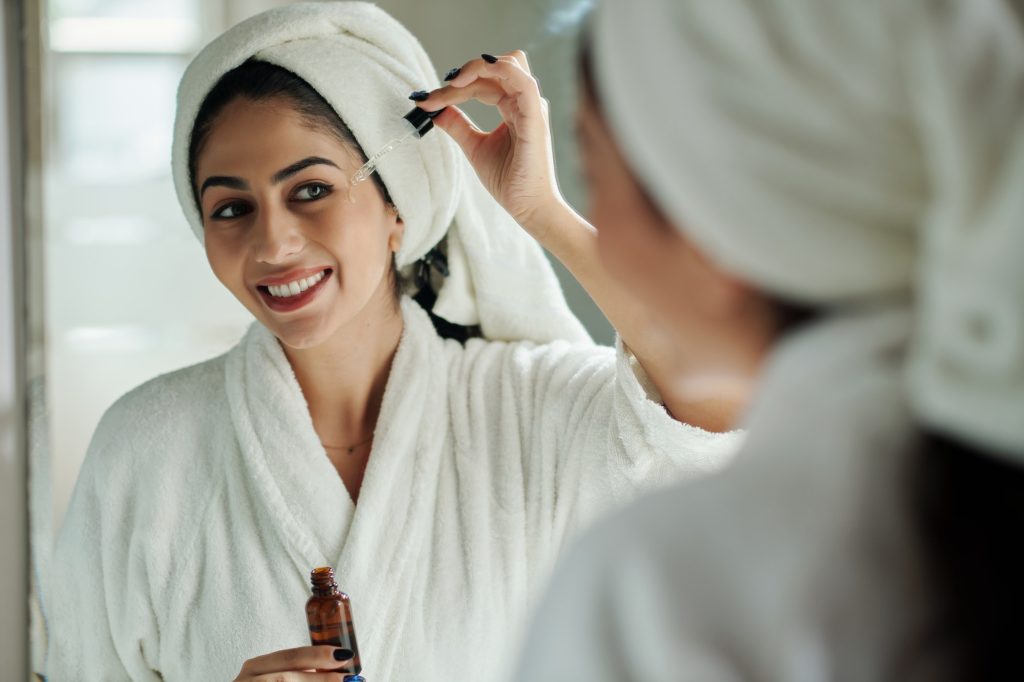
Importance of Collagen Biosynthesis for Skin Health
Our skin, the body’s largest organ, is a barrier that defends us from bacteria and other external threats. Collagen is a vital protein in the skin that provides structure and elasticity. As we age or experience injury, our bodies produce less collagen leading to wrinkles or slower healing processes. Hyaluronic acid has been shown to stimulate collagen production, making it a popular ingredient in skincare products targeting aging concerns or promoting faster recovery from wounds.
Potential Drawbacks of Combining Caffeine with Hyaluronic Acid
While hyaluronic acid and caffeine benefit skin health individually, combining them might not be ideal due to potential negative interactions between these active ingredients. Research indicates that high concentrations of caffeine can inhibit collagen synthesis by interfering with certain enzymes responsible for this process (source). This could potentially counteract the positive effects of HA when used together in skincare formulations designed for wound healing or anti-aging purposes.
Consumers may consider separate products with HA and caffeine such as The Inkey List Anti-Aging Skincare Set or consult a dermatologist for tailored advice on skincare plans that maximize both ingredients’ benefits without compromising their efficacy.
Research is still being conducted to fully comprehend the potential drawbacks of combining caffeine and hyaluronic acid for wound healing. Let’s explore how combining caffeine with other ingredients can provide antioxidant benefits.
Antioxidant Benefits of Combining Caffeine with Other Ingredients
In the quest for healthy, radiant skin, it’s essential to consider the synergistic effects of combining caffeine with other powerful ingredients. By doing so, you can harness the full potential of these active components and provide your skin with a comprehensive defense against oxidative stress.
Plant-based derivatives such as squalene
Squalene, a naturally occurring compound found in plants like olives and rice bran, is an excellent addition to any skincare routine due to its ability to improve moisture retention and promote elasticity. Combined with caffeine’s vasoconstrictive properties, squalene helps reduce puffiness while providing deep hydration that keeps your skin youthful and refreshed.
Antioxidant-rich extracts like Kakadu plum extract
Besides plant-based derivatives like squalene, incorporating antioxidant-rich extracts into your skincare regimen can further enhance caffeine’s benefits. One notable example is Kakadu plum extract, which boasts one of the highest concentrations of Vitamin C among fruits worldwide. This potent antioxidant combats free radicals responsible for breaking down collagen – a crucial component for maintaining firmness and reducing wrinkles.
- Vitamin C: Helps neutralize harmful free radicals caused by environmental factors such as pollution or UV radiation from sun exposure.
- Polyphenols: Powerful antioxidants that protect cells from damage by inhibiting enzymes responsible for breaking down collagen fibers in our skin.
- Gallic acid: A natural antioxidant with anti-inflammatory properties that can help soothe irritated skin and reduce redness.
Combining caffeine with these potent antioxidants can effectively protect your skin from oxidative stress while promoting long-term repair. This comprehensive approach to skincare ensures that you’re addressing immediate concerns like puffiness and safeguarding your skin’s health for the future.
Incorporating products containing both caffeine and powerful antioxidants, such as Inkey Caffeine Eye Cream, or even exploring DIY recipes using coffee grounds mixed with other nourishing ingredients, will give your skincare routine a much-needed boost in combating signs of aging and environmental damage.
Combining caffeine with other ingredients, such as plant-based derivatives and antioxidant-rich extracts, provides a unique antioxidant boost to products. Additionally, exploring alternative sources for producing hyaluronic acid from coffee beans could provide potential benefits in terms of cost and sustainability.
Alternative Sources for Producing Hyaluronic Acid from Coffee Beans
As the requirement for hyaluronic acid in skincare items keeps increasing, scientists are researching different options for delivering this essential element. One such promising method involves using coffee beans as a source of HA through a process called enzymatic hydrolysis.
Enzymatic Hydrolysis Process
Enzymatic hydrolysis is a technique that utilizes enzymes to break down complex molecules into simpler ones. Enzymes can be employed to fragment coffee beans, thereby allowing for the extraction of hyaluronic acid in an efficient manner. This innovative approach offers an eco-friendly and sustainable solution compared to traditional methods of obtaining HA from animal sources or bacterial fermentation.
Potential Benefits of Using Coffee Beans as a Source for HA
- Sustainability: Utilizing coffee beans as an alternative source reduces reliance on animal-derived ingredients and contributes to more environmentally friendly production practices.
- Economic Advantages: With millions of tons of coffee produced annually worldwide, there is potential for cost-effective production due to abundant supply and reduced waste in the industry.
- Innovative Skincare Products: Combining caffeine concentration with hyaluronic acid could lead to new product formulations targeting skin care concerns like oxidative stress, inflammation, and premature aging caused by environmental factors or sun exposure, which may contribute towards reducing the risk of skin cancer.
A recent study involving Streptococcus zooepidemicus demonstrated promising results in producing HA from coffee beans through enzymatic hydrolysis. The researchers achieved a 2 g/L HA concentration after 12 hours of cultivation, indicating the potential for further development and optimization of this method in skincare product manufacturing.
By harnessing the power of coffee beans as an alternative source for hyaluronic acid production, we can pave the way towards more sustainable and innovative skincare solutions that address various concerns while minimizing environmental impact.
The enzymatic hydrolysis technique of deriving hyaluronic acid from coffee beans is an efficient and cost-effective substitute to conventional approaches, enabling a more economical production. Furthermore, there are numerous potential benefits associated with using coffee beans as a source of HA. Now let’s explore how caffeine affects rats induced with glaucoma.
Caffeine's Effects on Hyaluronic Acid-Induced Glaucomatous Rats
Recent studies have explored the potential benefits of caffeine in hyaluronic acid-induced glaucomatous rats, specifically focusing on their Lateral geniculate body and primary visual cortex. The results show that caffeine significantly reduces intraocular pressure (IOP) while preventing neuronal cell loss, indicating its potential beneficial effects on chronic diseases like Alzheimer’s, where hyaluronic acid protects against oxidative stress.
Reduction in Intraocular Pressure with Caffeine Treatment
In a study conducted by Mokhtarzadeh et al., it was found that administering caffeine to hyaluronic acid-induced glaucomatous rats significantly reduced IOP levels. This is particularly important as high IOP is one of the major risk factors for developing glaucoma, which can lead to irreversible vision loss if left untreated. By reducing IOP levels, caffeine may help protect against further damage caused by increased pressure within the eye.
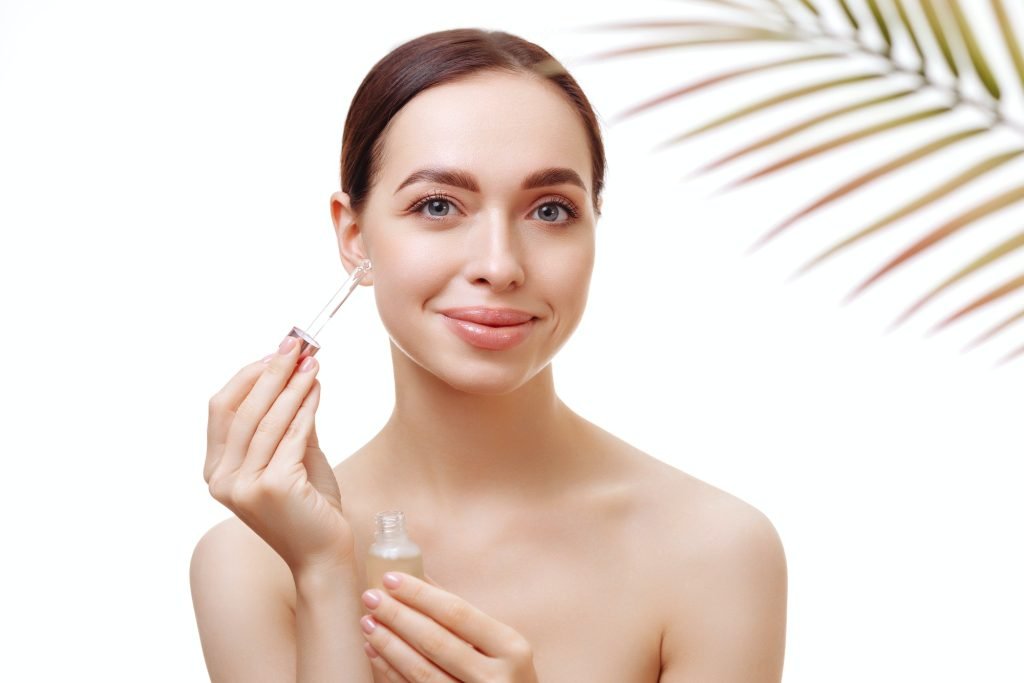
Preventing Neuronal Cell Loss through Attenuation of Proinflammatory Cytokines
Beyond its impact on IOP levels, research also suggests that caffeine has neuroprotective properties when used alongside hyaluronic acid. A key factor contributing to this effect is the attenuation of proinflammatory cytokines such as tumor necrosis factor-alpha (TNF-α) and interleukin 1 beta (IL-1β). These cytokines are known to cause inflammation and contribute to neuronal cell death; thus, reducing their presence helps preserve healthy cells within the eye and brain.
- Antioxidant properties: Caffeine’s antioxidant effects may also affect its neuroprotective capabilities. By neutralizing free radicals, caffeine can help protect cells from damage caused by oxidative stress, which is often associated with chronic diseases like Alzheimer’s and Parkinson’s.
- Vasoconstrictive effects: Caffeine works as a vasoconstrictor by tightening blood vessels. This property could improve blood flow to the retina and optic nerve, further supporting overall eye health.
Given the potential effects of caffeine, combining it with hyaluronic acid could be a promising avenue for skin and ocular health. Further exploration of this topic could likely uncover more about the advantages that can be gained and how they may be employed in skincare items or therapeutic regimens for diverse ailments.
FAQs
Caffeine is a natural stimulant that can have several benefits for the skin, including reducing puffiness, improving circulation, and brightening the complexion.
Hyaluronic acid is a humectant that can hold up to 1000 times its weight in water, making it a great ingredient for hydrating the skin and improving the appearance of fine lines and wrinkles.
Yes, caffeine and hyaluronic acid can work well together in skincare to provide both hydration and anti-inflammatory benefits. Many skincare products now combine these two ingredients for maximum benefits.
Caffeine and hyaluronic acid can be beneficial for all skin types, but particularly for those with dry, dull, or aging skin, as well as those with puffy eyes or dark circles.
Hyaluronic acid is a powerful humectant that attracts and retains moisture, helping to plump the skin and reduce the appearance of fine lines. Caffeine has vasoconstrictive properties, which can help reduce puffiness and dark circles under the eyes by constricting blood vessels. It also possesses antioxidant properties that protect against free radicals.
While caffeine and hyaluronic acid are generally considered safe for most people, some individuals may experience irritation or sensitivity to these ingredients. It’s always a good idea to patch test a new product before applying it all over your face.
Conclusion
Blending caffeine and hyaluronic acid has demonstrated potential in skin care products. Caffeine’s vasoconstriction abilities reduce inflammation and redness, while hyaluronic acid stimulates collagen production to promote healing; yet, its potential drawbacks must be considered, such as caffeine impeding wound repair. However, it is important to balance these benefits with potential drawbacks, such as caffeine inhibiting wound healing.
By combining caffeine with plant-based derivatives and antioxidant-rich extracts, skin care products can enhance their effectiveness for skin repair. Additionally, alternative sources of hyaluronic acid production through enzymatic hydrolysis may offer new opportunities for the skincare industry.
Tags: Guide

